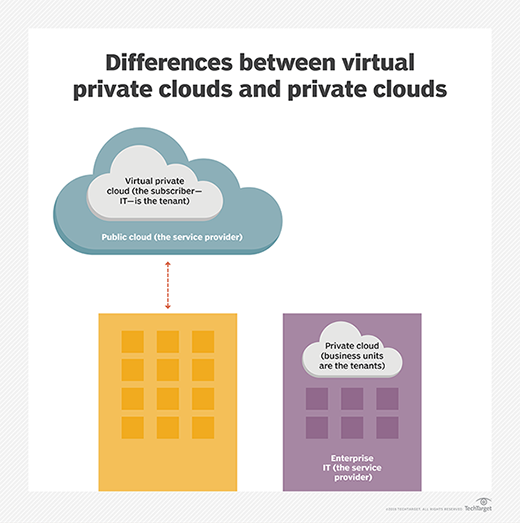
Fotolia
Compare the 3 types of private cloud
Private cloud isn't on-prem computing, but it can be. And on-prem IT isn't private cloud, but it can be. IT teams have many choices for private cloud, even within the public cloud.
Organizations operate private clouds on premises or off premises, on their own or through public cloud providers. Many companies aren't sure where they fall. Let's go over the three main types of private cloud deployment.
Private cloud abstracts the management of IT hardware and networking to enable scalable workloads in a single-tenant environment. The environment has known boundaries that isolate it physically from other workloads. In contrast, a public cloud runs workloads on shared infrastructure in a multi-tenant architecture. While public cloud promises isolation between tenant workloads, the cloud provider sets and maintains boundaries that are opaque to its users.
Any single-tenant environment that relies on a standardized architecture with policy-based configurations, governance and other operations is a private cloud. The most common type of private cloud is one that's housed within a data center the organization controls. In addition, organizations can reserve virtual private cloud resources on infrastructure maintained by a cloud vendor. While off-site for the user, this private cloud setup maintains data residency and single-tenant isolation. A third type of private cloud is also emerging, where the infrastructure resides on premises, but is controlled by a cloud vendor.
On-premises private cloud
On-premises private clouds offer the abstraction and standardization benefits of cloud computing, although capacity is limited to the available infrastructure. The organization is responsible for the full stack, from data center to hardware to management, as well as the application code that runs on it. Privately owned infrastructure racks are physically isolated, so different computing workloads are naturally separated. Therefore, these environments are suited to private cloud.
These types of on-premises private clouds use a common architecture built on OpenStack, Eucalyptus, Nutanix or another framework. Heavily virtualized IT systems, typically set up on VMware software, are common and offer many of the same benefits of private cloud, such as elastic resource consumption.

Gartner analyst Daryl Plummer, in a presentation at the firm's Application Strategies & Solutions Summit 2019 in Las Vegas, estimates that approximately 70% of private clouds are unsuccessful. Here are a few examples of what can stymie these efforts.
- Companies are not structured to run their own cloud -- they are organized into business units and allocate spending in a Capex model rather than an Opex one.
- They often fail to set up one standard private cloud architecture that shares IT resources and scales workloads elastically.
- Business units vie for custom application stacks and eschew templated deployments.
- Private clouds go over budget and underutilized, or are undelivered entirely.
"The enterprise is responsible for designing, development, deployment, governance, operations, evolution and updates ... Are you good at it? Are you as good at it as AWS or Google or Microsoft or Alibaba or Tencent?" Plummer said. "I can tell you right now -- I talk to thousands of customers a week -- the answer is no."
One way to address these private cloud challenges is to rely on public cloud providers for these resources. The physical divisions between servers for sales and risk analytics business units disappear off site. There is no more capital expenditure on hardware or space. There are two types of private clouds offered by public cloud providers: hosted private cloud and edge computing boxes.
Hosted private cloud off-premises
A hosted private cloud, also called a virtual private cloud (VPC), brings the single-tenant IT environment into the public cloud. The public cloud provider controls some aspects of the deployment, and enterprise IT teams must work within that vendor's boundaries. Well-known options include Amazon VPC and VMware Cloud on AWS, as well as Microsoft Azure Virtual Network.
There are advantages to a VPC. Using an IaaS provider solves the problem of limited infrastructure found in some on-premises data centers. It also encourages policy-based scaling and cloud management based on flexible capacity. But this approach isn't a magic solution to private cloud challenges, said Jeff Moyer, senior vice president of private and managed public cloud at Rackspace. Companies can still gate off stacks for one business unit or another and oversubscribe resources, no matter where the cloud workloads reside, he said.
Moyer cautioned that these Opex-based hosted types of private clouds don't inherently fix operational problems. "Cloud is easy to consume, and it's easy to lose control," he said. Organizations should focus on usage patterns and workload optimization whether they run their private cloud on-premises or through an IaaS provider.
On-premises infrastructure from public cloud vendors
Public cloud vendors offer limited versions of their services for deployment outside of the data centers they operate. These edge or distributed public cloud deployments -- whether software only or hardware and software -- synchronize the on-premises architecture with the public cloud. These deployments can act as isolated private clouds, but their pragmatic function is as a private component of a hybrid cloud, tethered to the vendor's public cloud.
With this hybrid cloud architecture, workloads can migrate between the on-premises public cloud and the public cloud data centers under a single control plane. Data residency and latency are protected when needed, keeping workloads in the local physical hardware, said Miles Ward, CTO at SADA Systems, a cloud consulting firm and Google Premier Partner. For example, a grocery store chain can process employee scheduling, inventory and point-of-sale workloads on a local private cloud, but stream data to "monster computing resources" in a public cloud to analyze the aggregate behavior of shoppers in 3,000 stores, he said.
While this version of private cloud is on premises, you don't technically control it. The public cloud provider owns the design, development and deployment of the services, Gartner's Plummer explained. And he sees that as a good thing, because public cloud vendors are better than corporate IT teams in terms of cloud innovation, skills and scale.
Consider these products to be a miniature public cloud extension, located in any number of settings, whether it's an enterprise data center, a flower shop or an industrial mining site. However, there are caveats. These are not complete replicas of a high-powered public cloud data center, with seemingly endless racks of hardware under complex management tooling. A private cloud with four racks of hardware, no matter how flexible and optimized, has limited capacity, Ward pointed out.
While a new category of private cloud, there are options from multiple major cloud providers. Azure Stack and AWS Outposts are designed as clouds in a physical box, while Azure Arc and Google Anthos bundle services to enable cloud-to-cloud interoperability. VMware has entered the fray with Tanzu and related products.
In late 2019, AWS also began to roll out AWS Local Zones, which colocate public cloud resources to strategic populations in conjunction with AWS Regions. While not technically a private cloud, AWS Local Zones continues the trend by public cloud providers to push more infrastructure capacity closer to businesses and users.
The physical build options for edge private cloud units are limited, and not all cloud vendors' respective services are available on them. Plummer expects more specialized configurations in the future, such as options preloaded with security settings for banking or a database-tailored setup.
"There's a lot of tire kicking on Azure Stack and AWS Outposts," Rackspace's Moyer said. "If you're Microsoft-aligned, Stack is attractive because of data latency, proximity of data, [and] governance legislation for where data is stored." He added that AWS Outposts is a newer product, and cloud adopters are researching its use cases -- and AWS's support for the product -- before they commit to buying it.






